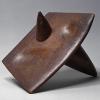
Late Spring
1949
Drama
1h 48m
Somiya was an old widower with a daughter, named Noriko, mature for marriage but would rather live with her father... (imdb)
Directed by:
Your probable score
?
Late Spring
1949
Drama
1h 48m
Your probable score
Avg Percentile 79.17% from 1074 total ratings
Ratings & Reviews
(1074)
Compact view
Compact view
Show
Sort
Rated 29 Dec 2013
92
98th
Extremely fine and very subtle. While the theme of tradition versus modernity is clearly present, the deeper theme seems to be the relation between dependence and independence, as well as that between freedom and constraint. And it is the austere constraint of his stylistic choices, but also the unfettered freedom with which he decides, for example, what must be shown or withheld from the audience, spoken or left unstated, that makes Ozu's work so fascinating, joyous, and quietly heartbreaking.
Rated 29 Dec 2013
Rated 08 May 2020
94
94th
It's fitting the film begins with a tea ceremony. This is equally delicate: People leave frame yet linger; speak in the absence of language. It balances social harmonies against the textures of the ingredients and the temperatures of the climate of its time. I've attended a Japanese tea ceremony myself and, to quote another author, "If a mere cup of tea can bring us closer to God, we should watch out for all the dozens of opportunities that each ordinary day offers us." That is Ozu.
Rated 08 May 2020
Rated 07 Feb 2007
84
81st
Pretty much on par with Early Summer, which it's awfully similar to. I listened to the commentary for a bit, and the guy was saying that within his limited scope, Ozu covers the whole of human experience. Well, no, he doesn't. But he covers certain parts of it very, very well. For me, a lot of the appeal is Setsuko Hara. She's mostly the same character in every film I've seen her in, but she fills that niche perfectly. She's also got one of the most disarming smiles I've ever seen
Rated 07 Feb 2007
Rated 18 Jan 2007
85
73rd
Favorite Ozu so far. It isn't really that different from any of the other films of his that I've seen so far, but somehow it feels more natural, more true, more meaningful, less tedious, and so on. It may be a simple matter of familiarity with his style. This time around I didn't even notice any of his typical quirks, such as the lack of camera movement and the whole 180 degree line issue in his dialogue scenes. It all feels very natural to me now.
Rated 18 Jan 2007
Rated 10 Jan 2017
85
91st
Ah, nothing like an Ozu film to warmly reconnect with humanity. Although Ozu's humanity seems to mostly inhabit a stable & conservative upper middle class existence, he has an uncanny ability to use composition, timing & structure to draw every bit of weight, nuance & reflective sentiment out of his dramas with an easy flow. More focused & less layered than some of these. The whole bittersweet essence of this is on Hara's intricate smile. First 45 mins of that noh scene were a bit perplexing.
Rated 10 Jan 2017
Rated 30 Dec 2013
6
83rd
very understated, and captures the bittersweet nature of life so beautifully, though not as transcendentally as tokyo story. most importantly, there is this quiet tugging between clinging to your past happiness and reaching for a new, independent life that is more unpredictable in what it may bring. it is very interesting that ozu chose not to show the prospective husband on screen. overall a very emotional experience.
Rated 30 Dec 2013
Rated 26 Apr 2011
91
97th
Another vote for "Favourite Ozu so far" here. Everything is done so methodical and deliberate, there are no wasted scenes let alone wasted moments. Setsuko Hara is great, but Chishu Ryu is magnificent -- his final scene peeling the apple was so beautiful that I had difficulty catching my breath afterward.
Rated 26 Apr 2011
Rated 17 Nov 2010
10
99th
Ozu's distinctive style is beautiful to watch if you enjoy slow paced films. This is a very moving story of a father and daughter relationship- full of understated emotions.
Rated 17 Nov 2010
Rated 05 Aug 2009
94
93rd
Once you get into Ozu's style, you realize this is one of his finest movies. It's so simple, traditional, that I couldn't understand it's value at my first watch (about one year ago). Now, every detail is superb, the final minutes are full of sincere emotion, instead of those fake, exaggerated feelings shown on most of familiar dramas.
Rated 05 Aug 2009
Rated 25 Jul 2012
70
19th
Parts of this film connected with me and others didn't. I appreciated it overall but struggled through it at times. I think Setsuko Hara is fantastic. I also liked the film's father-daughter relationship and the feelings and messages that it portrays.
Rated 25 Jul 2012
Rated 01 Aug 2019
85
86th
Ozu wants to explore the clash between tradition & modernism & Westernization & feminism & gender & family; and whereas most films would explore that conflict by positioning their main characters in one or more ideological poles, Ozu is happy to let his characters be complex humans, with complicated relationships, positions and feelings about all of the ideas above, and the movie feels so much more sincere as a result, with an emotional story earned not through melodrama, but human connection.
Rated 01 Aug 2019
Rated 09 Feb 2010
99
98th
A very fine film by Ozu on the usual subject of fathers and marriageable daughters. The relationship between the two--subtly played by Chishu Ryu and Setsuko Haro--is passionate and heartbreaking.
Rated 09 Feb 2010
Rated 01 Feb 2019
47
25th
I didn't like this at all, and reading all this praise in other reviews is tough on my overall feelings about it. Yes, it has beautiful static shots, but they linger long and drag away the attention. Yes, the father-daughter relationship is lovely, but also it's not?? I have difficulty expressing it, but in my heart I know I'll never be able to truly understand Japanese traditions and family morals. The cultural differences are just to big to overcome.
Rated 01 Feb 2019
Rated 12 Jul 2010
4
70th
Very serene and (of course) understated. Ozu loves his domestic drama and this is done very well. I really like both Chishu Ryu and Setsuko Hara, so that's a big part of the appeal here, and they do a great job of portraying the father-daughter relationship. Late Spring is concerned with how people shoehorn others (and are themselves shoehorned into) societal roles, and Ozu deals with the theme in a graceful and subtle manner.
Rated 12 Jul 2010
Rated 23 Jul 2018
85
87th
Noriko is in deep shit, but smile through it Noriko, smile through it. 'cause that's what they except of ya
Rated 23 Jul 2018
Rated 21 Nov 2016
98
99th
To be or not to be a nun. The angst to enter the boat of existence, which is impermanent, not-self, sufffering.
Rated 21 Nov 2016
Rated 16 Aug 2020
94
96th
It's sheer beautiful, painful poignant poetry from Ozu yet again.
Rated 16 Aug 2020
Rated 08 Mar 2023
93
84th
Beautiful music, picture and main actress, with a fascinating depiction of a girl's desire for marriage and family as a careful transference of her dedicated love for her father to her future husband, which potentially goes beyond both marriage as empty conventions and marriage as a purely "free" personal choice. This connection between transference and sexual desire also seems to be related to the subtly flirtatious aether between the daughters and their father's friends.
Rated 08 Mar 2023
Rated 22 Apr 2012
100
99th
One of the most perfect films ever put together. Every shot works so well. The transitional shots bring Ozu's trademark rhythm to the film, while mainstays Ryu and Hara simply shine in their performances. The simplicity, care, and gentleness of the father/daughter relationship are strikingly beautiful, while the final sequences with the bride in her gown and the father returning home are heartbreaking. And yet, Ozu somehow manages to make everything appear as it should be. Magnificent.
Rated 22 Apr 2012
Rated 31 Oct 2010
74
90th
Mono no aware
Rated 31 Oct 2010
Rated 13 Dec 2021
100
0th
Ozu at his prowess, climax, peak whatever you call but none Ozu movie blends emotion with a moral dilemma as this gut-wrenching masterpiece, better than Tokyo Monogatari, duh.
Rated 13 Dec 2021
Rated 13 Apr 2009
89
82nd
The bicycle ride is such a pure and beautiful scene... I watched that part seven or eight times. Ozu shows the simplicity of 'day after day' in a quite enjoyable way. It is something missing nowadays, and unfortunately most people don't like that kind of movie at all...
Rated 13 Apr 2009
Rated 07 Apr 2013
75
81st
There were some amazing shot compositions. I felt like a few scenes could've been trimmed, but it was mostly lovely and touching. The old school attitudes to women annoyed me a little, but I suppose it's all part of the setting. I find it hard to relate to characters who are so restrained, but I can appreciate the filmmaking skill and themes.
Rated 07 Apr 2013
Rated 08 Mar 2014
90
97th
Late Spring is one of those films you watch that completely absorbs you. While not an exercise in style, it's a contemplative film about characters, ideas, traditions and relationships. It is beautiful from start to finish contains two great lead performances, and permits you time to sit and stew about it while it's playing, not just after, through its lengthy takes even after the action has moved on. It's a film boiled down to its bare essence, and it's a powerful, wonderful watch.
Rated 08 Mar 2014
Rated 24 Aug 2008
5
80th
An early model of the mold that Ozu would refine into perfection over the next twelve years. It's basically there already and each viewing (I think I'm on the 3rd, maybe 4th) raises my appreciation.
Rated 24 Aug 2008
Rated 28 Sep 2023
6
31st
A touching tale of transitions; a witness to quietness of human growth. It's plodding in places, but has some of black-and-white cinema's most stunning samples of composition and lighting.
Rated 28 Sep 2023
Rated 09 May 2008
82
67th
It's a very good Ozu film but for some reason it didn't engage me the way his other films have. There's nothing wrong with it, the acting is good, the story is interesting enough and it deals with the issues it does in a very human way. I just felt like he did all this better in his later films.
Rated 09 May 2008
Rated 07 Aug 2016
7
69th
Moves slowly but has a few laughs in it. Chishû Ryû steals the show as Noriko's father.
Rated 07 Aug 2016
Rated 01 Mar 2008
92
87th
# 166
Rated 01 Mar 2008
Rated 27 Feb 2014
90
96th
I don't think it's appropiate to interpret the film within such modern concepts as feminism or 'constrained vs. free', even though it would be easy to do so. Ozu is, above all, a believer in the static, serene, personal now. With a overall style reflecting that, fx the famous 'pillow shots' or the remarkably static bike ride scene, he simply explores, in a deeply profound way, how two people succumbs to abandoning their comfortable life status quo, and perhaps the 'tragic' inevitability of it.
Rated 27 Feb 2014
Rated 20 Feb 2009
79
60th
It's a well made film but isn't really remarkable in any way.
Rated 20 Feb 2009
Rated 25 Nov 2016
100
99th
Heartbreaking. Ozu is just so compassionate. The characterisations of Nori and her father are wonderful: partly I just really enjoyed spending time with both these characters, but also on top of this a lot of stuff regarding both of them is made not wholly clear making them more real, emotionally resonant and more engaging. Interesting note: we never see the man that Nori is arranged to marry. Who he is isn't important, he could be anyone and that wouldn't change how Nori feels.
Rated 25 Nov 2016
Rated 07 Sep 2016
90
99th
Late Spring is the master director's best film and a complete showcase for his unique talent. His static camera and idiosyncratic methods of staging/blocking create a contemplative aura that enables shots and scenes to linger and gain significance through a patient accretion of detail. The plot deals with attempts by family members to marry off Noriko, played with heartbreaking conviction by Setsuko Hara, despite her lack of interest. The resolution is profoundly moving and subtly subversive.
Rated 07 Sep 2016
Rated 17 Jun 2018
65
53rd
A film that did not age well. It has some touching moments, the classic Ozu sensibility and a humor in its favor, but with many aimless scenes, primitive structure and a leading character (the daughter) that's an insult to every feminist notion, I find it impossible to honestly admire this today.
Rated 17 Jun 2018
Rated 07 Jul 2014
90
85th
The stillness of the moments between scene changes allow emotions to linger, and to have a contemplative aura around the film. The drama is not high stakes on the grand scheme of things, but for Noriko it's about her happiness and her control. It has a feeling that it exists in a time just before tradition becomes openly questioned, and that's where its postwar setting is most heavily felt. It's beautiful and sad and so delicately paced.
Rated 07 Jul 2014
Rated 14 Dec 2017
60
31st
evlilik çağı gelip geçmek üzere olan bir kızın babasının yanındaki hayatı, evliliğe bakışı ve baba-kız arasındaki iletişim konularını tüm gerçekçiliğiyle işleyen yönetmenin anlatım stilinin sadeliği filmden aldığım tadı yavan bırakıyor. sıkıcı değil ama konusu spesifik, herkesin ilgisini çekmeyebiliyor.
Rated 14 Dec 2017
Rated 12 Jul 2017
8
87th
Pretty much perfect film making in terms in respect to storytelling, editing, cinematography. The subject matter wasn't totally my favourite, but I'd still like to see more Ozu and see in what other ways he deals with similar themes.
Rated 12 Jul 2017
Rated 23 Nov 2011
61
81st
Wonderful movie that displays the psyche of postwar Japan and explores the father-daughter relationship while giving insight into the nature of arranged marriage as well as relationships in general. Pacing is slow by today's standards, but stick with it and take the time to develop a connection with the characters.
Rated 23 Nov 2011
Rated 20 Sep 2010
100
99th
Spoiler alert. Noriko makes me think of this little girl out of Proust. Her parents just want her to be happy. What makes her happy is making her parents happy. So her parents buy her cake for her birthday that she doesn't like but to make them happy she pretends to like it. Of course that just means choking down more and more cake, and that's that dysfunctional little knot of misery we call family. Parents suck.
Rated 20 Sep 2010
Rated 27 Jun 2022
83
67th
Ozu movies be like oh boy this is so slow an-WAIT why am I crying now
Rated 27 Jun 2022
Rated 29 Mar 2018
5
95th
So beautiful. Rewatch for scenes of confrontation.
Rated 29 Mar 2018
Rated 19 Dec 2008
91
82nd
190
Rated 19 Dec 2008
Rated 18 Nov 2020
80
83rd
The exact opposite of didactic this one. Modernity/Tradition, Change/Comfort, Feminism, and Family all layer onto each other and the characters move through those layers as they navigate difficult life choices as multidimensional real people.
Rated 18 Nov 2020
Rated 13 May 2011
87
96th
The last scene, without a single line of dialogue, has more emotion than you will find in a dozen other films. I feel like I just took a bitter sweet walk through a few people's lives rather than having just watched a film.
Rated 13 May 2011
Rated 27 Oct 2014
95
92nd
Fantastisk Ozu om unge Noriko som tvinges inn i ekteskapet av sin nære familie, ikke fordi de er leie, men fordi de mener det er til det beste for henne. Sårt, menneskelig og knallgode prestasjoner av både Noriko og faren. Ekteskapet som et fengsel er hovedtematikken, men også tradisjon for tradisjonens skyld og hvordan dette kan være en uting. I mine øyne bedre enn Tokyo Story.
Rated 27 Oct 2014
Rated 28 Feb 2019
92
88th
91.50
Rated 28 Feb 2019
Rated 08 Nov 2021
40
30th
Acclaimed but I remember it as boring with some touching moments. I should rewatch
Rated 08 Nov 2021
Rated 18 Aug 2011
100
97th
An utterly beautiful film which touches upon two issues - the relationship between parents and their children, and feminine roles both in post-war Japan and universally - perfectly in a single story. Add to this Ozu's acute use of mise-en-scene (such as a close-up of a pile of collapsing magazines at the emotional shift in the film) and his sympathy for all the characters, despite the potential issues with their actions, and the film is an even greater accomplishment.
Rated 18 Aug 2011
Rated 08 Aug 2010
5
93rd
A pure distillation of the motifs Ozu would come to refine in subsequent films, on generational strife and social roles. It is an old fashioned and conservative film, but so gentle and made with such compassion. A masterful display of traditional Japanese living; of stillness, mannered behavior, and long, slow days.
Rated 08 Aug 2010
Rated 15 Aug 2012
96
99th
Setsuko Hara's beautifully nuanced performance was probably the highlight for me. She portrays Noriko's innocence, conflict and pain so brilliantly, it is at times extremely moving and sometimes even surpisingly dark. Ozu's direction is wonderful too, so simple, deliberate and delicate. This movie had already totally won me over, but then Ryu's stunningly moving final scene raised the whole movie to the level of true greatness in my eyes. Wonderful.
Rated 15 Aug 2012
Rated 28 Jan 2021
100
98th
first time: 2015
Rated 28 Jan 2021
Rated 29 May 2019
95
95th
*Freud intensifies* O problema de ser da psicanálise é você encontrar Édipo em tudo, mesmo em sociedades não-judaicas-cristãs cuja linguagem e semiótica perpassam outras questões que não as ocidentais, mas pqp, o jeito de cortar o pepino revela o quão ciumenta você é? Se eu não levar isso pro lado psicanalítico terei que jogar a toalha comigo mesma. Rá! Box O Cinema de Ozu Volume 2.
Rated 29 May 2019
Rated 16 Sep 2011
79
77th
Rather slow and simple concept, but the ending is so beautiful and actually very sad too, I was almost crying!
Rated 16 Sep 2011
Rated 19 May 2013
95
95th
11 Mart 2013, ftv film history & herkes kendisini sikintidan yerlere atarken, benim bogazim dugumlendi. Ozellikle No tiyatrosu sahnesi, bisiklet sahneleri iz birakti. Bu kadar oz olabilmek cok zor olmali.
Rated 19 May 2013
Rated 12 Apr 2012
78
71st
-Really? -Yeah -Are you sure? -Yeah -Definitely? -Yeah
Rated 12 Apr 2012
Rated 10 May 2013
90
92nd
Ozu's simple blocking, stagnate camera, and conversational dialog create a feeling of calm. In fact, "calm" is a great way to describe the movie as a whole. It's gentle, innocent, and relaxed. Yet at the same time it has a subtle undercurrent of sadness. The characters deal with each other in loving ways, always doing what they feel is right even if it hurts themselves in the end. Despite its simplicity, this is a profound story about love, marriage, aging, conformity, and sacrifice. Fabulous.
Rated 10 May 2013
Rated 25 Jun 2014
80
32nd
When social convention makes us assume what we know about each other, we often misperceive what is most true about those we love. This film explores complex relationships and cultural assumptions. Perhaps some of the finest cinematography ever.
Rated 25 Jun 2014
Rated 13 Oct 2020
100
99th
Such an intensely bitter-sweet narrative, unbelievably rich in culture and brilliance. Setsuko Hara's performance manages perfectly to be both restrained and powerful--never have I empathized so much with a fictional character who's circumstances are entirely separate from my own. A movie that continuously leaves me incredulous at it's raw sincerity; Late Spring is my favorite of Ozu's filmography and probably my favorite movie ever, period.
Rated 13 Oct 2020
Rated 20 Jul 2022
55
44th
I get those who enjoy Ozu's uncomplicated dialogue, static photography and quaint, rustic nihonjinron. I kinda see it, myself. But I do believe even they would struggle to locate any sort of human insight or worthwhile subtext in the sprawling trilogy of Noriko, whether or not she's getting married and whom to, and how happy she's making her parents; because these general talking points constitute the full extent of an extremely blunt text, across three extremely drab films starting here.
Rated 20 Jul 2022
Rated 13 Jan 2010
90
80th
195
Rated 13 Jan 2010
Rated 10 Mar 2013
69
77th
Another very good Ozu film, and one with some really inspired camerawork. I've said this before about Ozu, but I find it's often hard to know what to make of the ambivalence he often seems to show toward social convention. Sometimes he seems to want to have his cake & eat it too, but one never doubts his sincerity.
Rated 10 Mar 2013
Rated 08 Jun 2022
74
51st
Beautifully made but a tad repetitive at times, perhaps. The characters all feel real and the usual Ozu themes are present. I thought the choice not to ever feature Noriko's match on screen was a great one. The movie is about 1:50 long but I felt it maybe could have even been cut a tad, as there is a lot of the "you should get married" "don't wanna" in slightly different ways. I think there is also a bit lost in translation in regards to time and culture here. A very good film, though.
Rated 08 Jun 2022
Rated 28 Oct 2021
80
99th
All about those light sensitive touches by Yasujirô Ozu. And what touches it was! For what is just a gentle story of the social pressure of not being married, turns into a warming experience with a effective sad smack.
Rated 28 Oct 2021
Rated 02 Aug 2022
85
87th
gotta love ozu and his portrayal of characters, relationships and camera angles
Rated 02 Aug 2022
Rated 30 Nov 2011
90
80th
#195
Rated 30 Nov 2011
Cast & Info
Directed by:
Collections
Loading ...
Similar Titles
Loading ...
Statistics
Loading ...
Trailer
Loading ...
PSI
?





























































